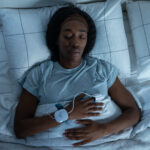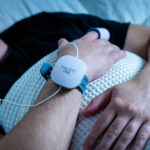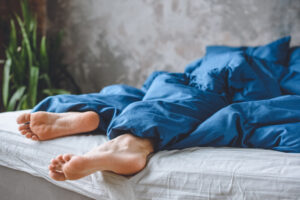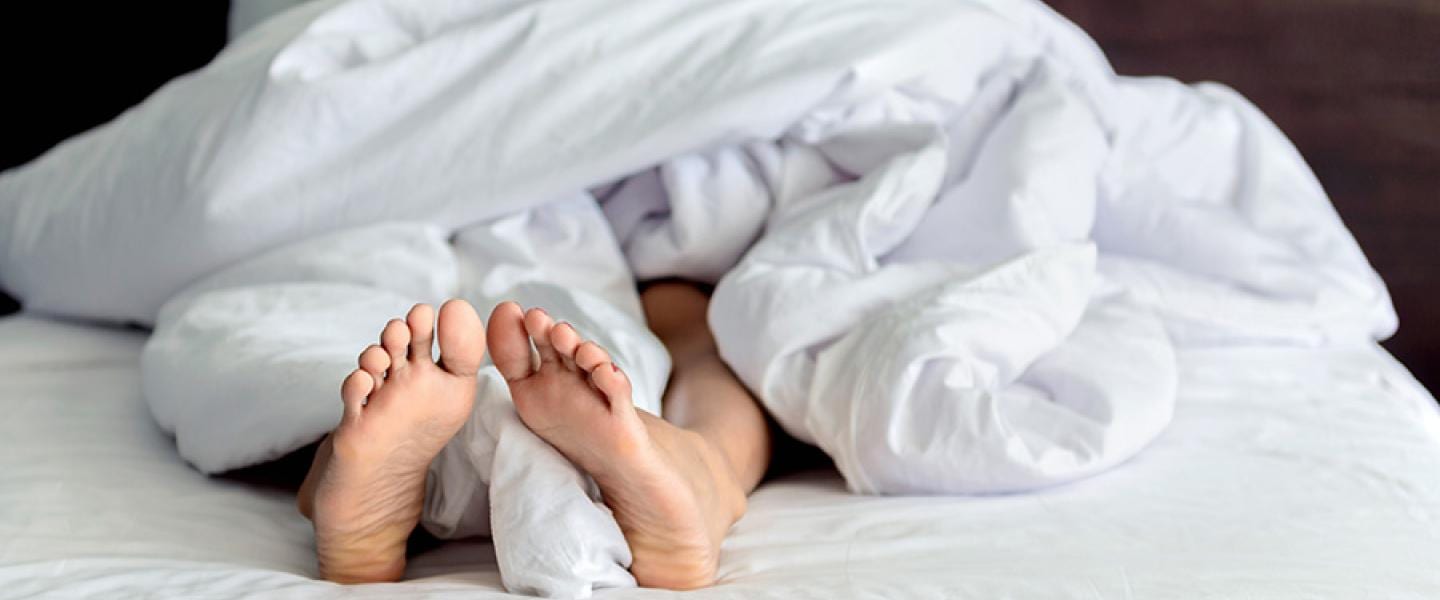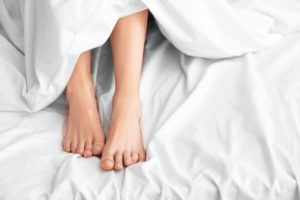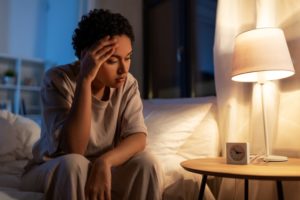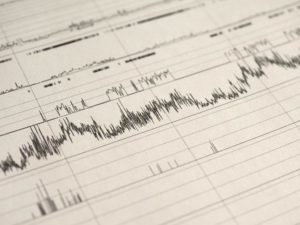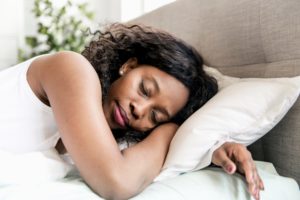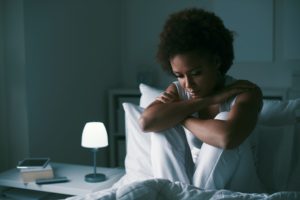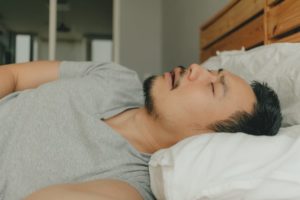COPD and Difficulty Breathing
Chronic Obstructive Pulmonary Disease (COPD) is a chronic inflammatory lung disease characterized by obstructed airflow that impairs breathing in and out of the lungs. COPD includes emphysema, which is characterized by damage to lung tissue, and chronic bronchitis, which involves a persistent, mucus-producing cough. Many people who have COPD suffer from both.
Sleep troubles are common in those who suffer from COPD. People who have a hard time breathing at night due to COPD may wake frequently and have trouble falling asleep or staying asleep, throughout the night. Overall reduced sleep time and sleep quality may also occur.
What Is COPD?
COPD affects almost 16 million people in the United States alone and is the third most common cause of death due to disease . Smoking is the primary cause of COPD, with smoking history noted in up to 75% of COPD cases. Secondhand smoke, exposures to other pollutants, and more rarely, genetic conditions, can also increase the risk of developing COPD. COPD is a progressive disorder, which means that it gets worse over time, leading to shortness of breath, wheezing, chest tightness, persistent cough, and susceptibility to infections like pneumonia.
Can Breathing Difficulties From COPD Affect Sleep?
Those with COPD can experience oxygen desaturation (hypoxemia), or reduced oxygen levels in the blood. Severe COPD is often characterized by hypoxemia during the day, and worse daytime hypoxemia is correlated with more episodes of hypoxemia during sleep. Hypoxemia especially impacts rapid eye movement (REM) sleep, the stage of sleep where dreams occur.
When people with COPD experience sleep disruptions and don’t get enough sleep, they become sleep deprived. Sleep deprivation negatively impacts focus, memory, judgment, and mood, and can make you feel very tired during the day.
In addition to the symptoms of COPD, some medications used to treat COPD can make sleeping problems worse. Drugs like theophylline (Theo-24, Theochron, Elixophylline) improve chest symptoms in COPD patients but reduce sleep quality for some.
Why Can’t I Breathe At Night?
Over 75% of individuals with COPD report nighttime symptoms and difficulty sleeping . People with lung disorders commonly report that breathing is more difficult while lying down , so patients with COPD may notice their symptoms worsen when they get into bed.
Since wheezing and coughing can understandably make falling asleep very difficult, some COPD patients attempt to sleep while sitting upright in a chair. And, although sitting upright may relieve chest symptoms, it can also make falling asleep more difficult. As such, COPD patients may suffer from insomnia as they stay awake struggling to find a comfortable sleeping position.
Think You May Have Sleep Apnea? Get Help Today

our partner at sleepdoctor.com
Black Friday Sale: 20% off Home Sleep Tests
Buy Now“Truly grateful for this home sleep test. Fair pricing and improved my sleep!”
Dawn G. – Verified Tester
Are Sleep Disorders Common in People with COPD?
Sleep-related breathing disorders affect breathing patterns and blood oxygen levels during sleep. Sleep-disordered breathing in COPD patients has been examined by a number of studies, although they have offered varied results on the number of patients who experience both.
COPD frequently coincides with obstructive sleep apnea (OSA), a condition characterized by gaps in breathing during sleep . Sleep apnea causes frequent and sudden nighttime awakenings, as well as drops in blood oxygen levels that accompany spikes in carbon dioxide levels. Co-occurring COPD and OSA are known as “ overlap syndrome “, which is associated with more severe decreases in blood oxygen during the night.
How Do I Know If I Have a Sleep Disorder and COPD?
True to its name, overlap syndrome can be difficult to distinguish from isolated diagnoses of COPD or sleep-disordered breathing (SDB) alone, due to the number of symptoms shared between both disorders. These symptoms include reduced sleep quality, sudden awakenings featuring gasping and choking, headaches upon waking, and excessive daytime sleepiness. However, experts have identified certain features in COPD patients who suffer from SDB .
The presence of any of the following symptoms may prompt doctors to evaluate COPD patient’s sleeping difficulties with a sleep test:
- Snoring, gasping, or choking during the night
- Morning headache
- Excessive daytime sleepiness
- Obesity
- Reduced daytime oxygen saturation (hypoxemia)
- Increased daytime carbon dioxide saturation (hypercapnia)
- Pulmonary hypertension
- Right heart failure
- Polycythemia (high concentration of red blood cells in your blood)
- Opioid/hypnotic prescription use
- History of type 2 diabetes, heart failure, or stroke
Further, experts note that nighttime symptoms in COPD patients may be overlooked by physicians, suggesting that overlap syndrome is more common than what is currently known. Therefore, it is important for individuals with COPD to proactively report nighttime symptoms to their providers and ask if scheduling a sleep test is recommended.
How Do I Sleep With COPD?
Falling asleep with COPD can be tough, especially when symptoms worsen at night. Chest symptoms and gastroesophageal reflux (GERD), which often afflicts COPD patients can flare up when lying down. You might try sleeping in a slightly upright position – propping your head can relieve chest symptoms and make you feel more comfortable.
Because COPD patients may have additional barriers to getting good sleep, practicing good sleep hygiene habits is especially important. Follow these tips to maximize your sleep quality:
- Limit napping to under 30 minutes and avoid naps in the late afternoon. A short nap can restore energy, but a long nap or a late nap can keep you awake at night.
- Avoid eating or drinking late in the day. You want to give your body time to digest and avoid waking up during the night to use the bathroom.
- Get moving! Make sure you get at least some moderate physical activity in.
- Turn off the electronics — cut off phone, computer, and tablet use at least 30 minutes before bed.
- Quit smoking! Especially if you suffer from COPD, quitting is one of the best things you can do for your health.
Are There Treatments for Sleep Affected by COPD?
Yes, there are treatments available for COPD symptoms that negatively impact sleep or overlap with sleep-disordered breathing. Experts recommend the primary goals of therapy for overlap syndrome are to reduce hypoxemia (low blood oxygen) and hypercapnia (high blood carbon dioxide) during sleep.
Continuous positive airway pressure (CPAP) is a machine that helps keep airways open and prevent collapse during sleep by pumping in air. The CPAP machine is the first line of treatment for COPD patients with moderate to severe OSA. Additional oxygen therapy is indicated for those who experience severe daytime hypoxemia.
Medicines may also be used to treat chest symptoms and sleep symptoms in COPD patients. It is important to review all medications with your provider, as they will consider which medications may have a positive or negative impact on your sleep.

Still have questions? Ask our community!
Join our Sleep Care Community — a trusted hub of sleep health professionals, product specialists, and people just like you. Whether you need expert sleep advice for your insomnia or you’re searching for the perfect mattress, we’ve got you covered. Get personalized guidance from the experts who know sleep best.
References
14 Sources
-
MedlinePlus: National Library of Medicine (US). (2020, September 29). COPD. MedlinePlus., Retrieved January 27, 2021, from
https://medlineplus.gov/copd.html -
Wise, R. A. (2020, May). Chronic obstructive pulmonary disease (COPD). Merck Manual Consumer Version., Retrieved January 27, 2021, from
https://www.merckmanuals.com/home/lung-and-airway-disorders/chronic-obstructive-pulmonary-disease-copd/chronic-obstructive-pulmonary-disease-copd -
National Heart, Lung, and Blood Institute. (n.d.). Sleep deprivation and deficiency., Retrieved January 27, 2021, from
https://www.nhlbi.nih.gov/health-topics/sleep-deprivation-and-deficiency -
Weitzenblum, E., & Chaouat, A. (2004). Sleep and chronic obstructive pulmonary disease. Sleep Medicine Reviews, 8(4), 281–294.
https://pubmed.ncbi.nlm.nih.gov/15233956/ -
Agusti, A., Hedner, J., Marin, J. M., Barbé, F., Cazzola, M., & Rennard, S. (2011). Night-time symptoms: A forgotten dimension of COPD. European Respiratory Review, 20(121), 183–194.
https://pubmed.ncbi.nlm.nih.gov/21881146/ -
A.D.A.M. Medical Encyclopedia. (2019, January 19). Breathing difficulty – lying down., Retrieved January 27, 2021, from
https://medlineplus.gov/ency/article/003076.htm -
Silva, J., Júnior, Conde, M. B., Corrêa, K. S., Rabahi, H., Rocha, A. A., & Rabahi, M. F. (2017). Sleep-disordered breathing in patients with COPD and mild hypoxemia: Prevalence and predictive variables. Jornal Brasileiro de Pneumologia, 43(3), 176–182.
https://pubmed.ncbi.nlm.nih.gov/28746527/ -
Strohl, K. P. (2019, March). Merck Manual Consumer Version: Sleep Apnea., Retrieved January 27, 2021, from
https://www.merckmanuals.com/home/lung-and-airway-disorders/sleep-apnea/sleep-apnea -
Singh, S., Kaur, H., Singh, S., & Khawaja, I. (2018). The overlap syndrome. Cureus, 10(10), e3453.
https://pubmed.ncbi.nlm.nih.gov/30564532/ -
McNicholas, W. T., Hansson, D., Schiza, S., & Grote, L. (2019). Sleep in chronic respiratory disease: COPD and hypoventilation disorders. European Respiratory Review, 28(153), 190064.
https://pubmed.ncbi.nlm.nih.gov/31554703/ -
McNicholas, W. T., Verbraecken, J., & Marin, J. M. (2013). Sleep disorders in COPD: The forgotten dimension. European Respiratory Review, 22(129), 365–375.
https://pubmed.ncbi.nlm.nih.gov/23997063/ -
Lee, A. L., & Goldstein, R. S. (2015). Gastroesophageal reflux disease in COPD: Links and risks. International Journal of Chronic Obstructive Pulmonary Disease, 10, 1935–1949.
https://pubmed.ncbi.nlm.nih.gov/26392769/ -
MedlinePlus: National Library of Medicine (US). (2018, October 31). Gastroesophageal reflux – discharge. MedlinePlus., Retrieved January 31, 2021, from
https://medlineplus.gov/ency/patientinstructions/000197.htm -
A.D.A.M. Medical Encyclopedia. (2020, January 29). Positive airway pressure treatment., Retrieved January 31, 2021, from
https://medlineplus.gov/ency/article/001916.htm


